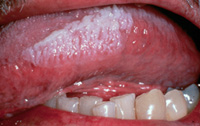
What is Oral Hairy Leukoplakia
Oral hairy leukoplakia is an unusual form of leukoplakia that occurs most commonly in people with compromised immune systems, and especially in HIV/AIDS patients.
Contrary to the common oral leukoplakia, hairy leukoplakia is not linked with mouth cancer. But, it can be the first symptom of an HIV infection.
Causes of oral hairy leukoplakia
Oral hairy leukoplakia is thought to be caused by the Epstein-Barr virus (EBV). Many people get infected with EBV in childhood — often without having any symptoms. The virus remains inactive in their body for life but if their immune system is weakened, either from disease or certain medications, it can become reactivated, leading to conditions such as hairy leukoplakia.
People living with HIV/AIDS are in high risk to develop hairy leukoplakia. Oral hairy leukoplakia affects as many as one-fourth of HIV-positive people, and may be one of the first signs of HIV infection.
Oral hairy leukoplakia symptoms
Hairy leukoplakia appears as fuzzy, white patches that resemble folds or ridges on the edges of the tongue. These lesions usually have an irregular surface and may have hair-like projections.
See what does hairy leukoplakia look like - click here for more pictures of oral hairy leukoplakia
Treatment of Oral Hairy Leukoplakia
Hairy leukoplakia is not painful and does not lead to cancerous growth. Usually there is no need for treatment unless it causes discomfort or alters the taste. Hairy leukoplakia treatment is done with antiviral medication :
- Systemic medications. These include antiviral drugs such as valacyclovir and famciclovir, used to treat Epstein-Barr. Treatment with antivirals can clear leukoplakic patches within a week or two, but unfortunately symptoms often return when the drugs are discontinued.
- Topical medications. These include podophyllum resin solution and tretinoin (retinoic acid). They can heal hairy leukoplakia but have a tendency to affect the patient’s sense of taste and again, the patches return when the treatment is stopped.
 Oral hairy leukoplakia symptoms are not painful and the condition does not lead to cancerous growth.
However, in some cases oral hairy leukoplakia is a sign of the presence of HIV/AIDS.
Contact your dentist or doctor if you notice any of the related symptoms.
Oral hairy leukoplakia symptoms are not painful and the condition does not lead to cancerous growth.
However, in some cases oral hairy leukoplakia is a sign of the presence of HIV/AIDS.
Contact your dentist or doctor if you notice any of the related symptoms.
![]() The cost involved with dental treatments can be significant and many patients may not afford it if they are not covered by their dental insurance.
Learn how to choose a dental insurance plan that will provide the best dental treatment to yourself and your family.
The cost involved with dental treatments can be significant and many patients may not afford it if they are not covered by their dental insurance.
Learn how to choose a dental insurance plan that will provide the best dental treatment to yourself and your family.



